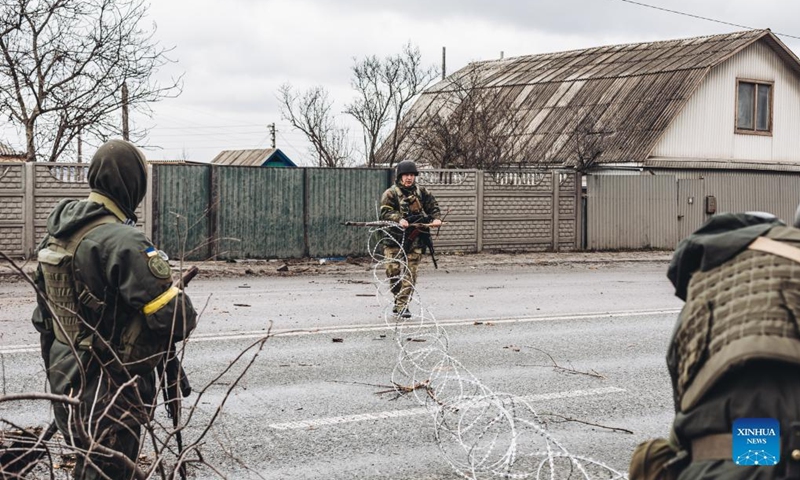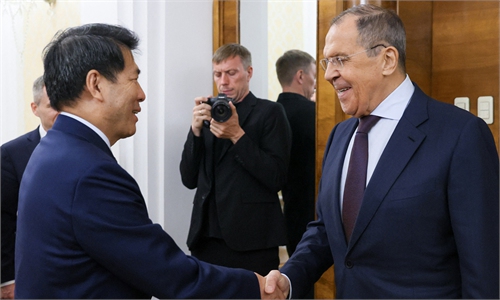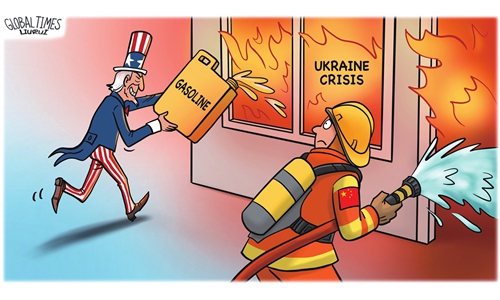
Ukrainian soldiers set up roadblocks in Irpin, Ukraine, on March 4, 2022. File Photo:Xinhua
Chinese special envoy Li Hui met with Ukrainian President Volodymyr Zelensky in the first stop of his European tour. The latter expressed a clear stance on valuing China's role in promoting peace talks, giving Li's trip a good start.
In February of this year, China proposed a 12-point peace plan to end the Russia-Ukraine war, which the US clearly opposed. However, as we entered May, Washington's attitude has quietly changed. US Secretary of State Antony Blinken said in a media interview, "We would welcome that, and it's certainly possible that China would have a role to play in that effort. And that could be very beneficial." Washington seems to be shifting from criticizing China to supporting it, which is significant in the Western world.
All parties involved are still focused on continuing the war, with intense fighting in the direction of Bakhmut recently, and Russian forces continuously striking key targets throughout Ukraine. The Ukrainian side claims to have intercepted an increasing number of Russian missiles. However, on Wednesday, two US officials revealed that a US-made Patriot missile defense system being used by Ukraine likely suffered some damage from a Russian strike, while Russia claimed that the system was destroyed. Germany, France, and the UK have all expressed their intention to increase military aid to Ukraine, with Germany's latest approved package reaching up to 2.7 billion euros, including dozens of tanks and armored personnel carriers.
However, more and more Western analysts believe that it is difficult for the Ukrainian military to fundamentally reshape the battlefield situation. In other words, achieving a thorough victory through war is unrealistic. This is a war of attrition, and such a war will ultimately end at the negotiating table. Therefore, the West is actually preparing for future negotiations by creating a Ukrainian military offensive. The Ukrainian side's attitude is very tough: Russian troops must withdraw from all occupied territories, including Crimea. The Russian side has not talked about negotiations recently, and Putin and his comrades seem to be focused on winning the battlefield. Both sides appear tough, but some of this attitude is a gesture shown to the other side.
Regarding China's peace plan, Ukraine and the West seem to have completed their attitude construction: from hesitation and indifference to open welcome. Moscow's overall attitude has been positive, despite some of the provisions in the 12-point plan being incompatible with Russia's strategic goals.
In the long run, China may be the best choice to mediate the Russia-Ukraine conflict. China is a major country with good relations and the ability to communicate with both sides. China has the power and qualifications to serve as a mediator. Considering that a prolonged war is of no practical significance to both sides and that neither side can destroy the other - Ukraine has the entire West on its side, while Russia is a superpower with nuclear weapons - eventually, both sides will have to compromise. Therefore, China's mediation, although difficult at first, will become an increasingly important dimension in the development of the situation.
With the US presidential election next year, a clear situation in the Ukraine war would be advantageous for Biden's re-election campaign. Europe has been hit hardest by this war, apart from Russia and Ukraine. European leaders may talk tough, but they all hope the war will end soon. The people of Europe do not want their national budgets to flow into the bottomless pit of the Ukraine war.
China's stance on mediating the Ukraine conflict is low-key. Envoy Li Hui's official title is the Special Representative of the Chinese Government on Eurasian Affairs, not something like "ambassador for mediating the Russia-Ukraine conflict." Mediating this war is indeed difficult, and finding common ground between the two sides is not easy, so China does more and says less.
Ukraine demands that Russian troops unconditionally withdraw from the occupied territory, but Russia has officially incorporated Crimea and four areas into its territory, declaring that it will never betray those regions. There seems to be no room for compromise. Is it possible for the war to stop?
Both Russia and Ukraine still have the strength to continue fighting, even launching local offensives, but their overall strategic goals have become increasingly elusive. Anti-war sentiment is brewing and developing within Russia, while the patience and momentum of Western forces behind Ukraine are being eroded. China certainly does not have the ability to present a peace plan on the table and demand that both sides adhere to it. China is a banner for an alternative approach to conflict resolution, providing a platform when both sides cannot afford to continue fighting.
It should be noted that neither the West nor Russia has used their most ruthless tactics. Western troops have not directly participated in the conflict and haven't provided long-range weapons that could strike Russia's mainland, and Russia has not used tactical nuclear weapons as it has threatened to do. All of these sends a vague signal that they do not want the war to escalate indefinitely and want to create conditions that will allow the war to stop.
The author is a commentator with the Global Times. opinion@globaltimes.com.cn



